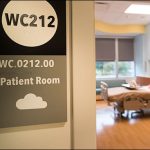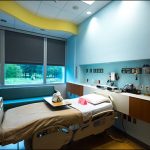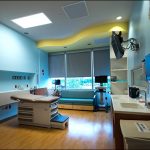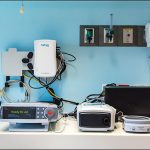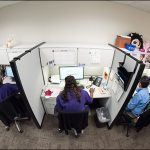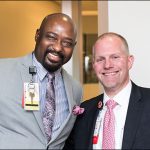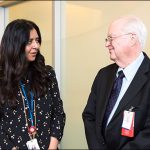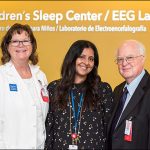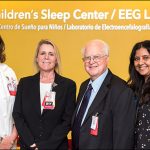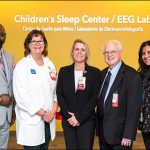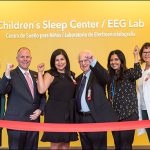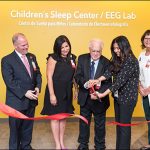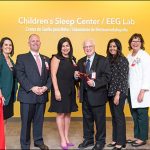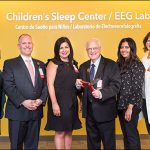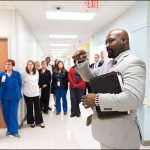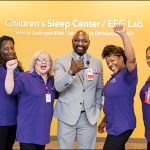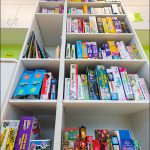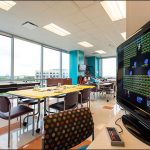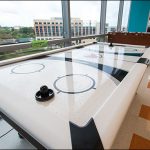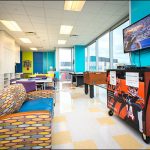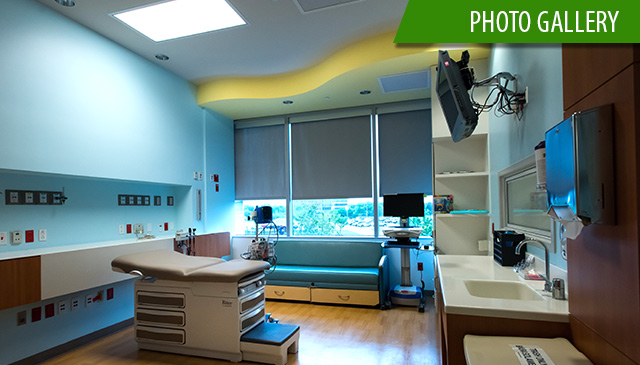
On March 25, the first patient was seen in the new expansion of Texas Children’s Hospital West Campus Sleep Center. Going from six beds on the fourth floor, to nine beds with six available for future expansion on the second floor, the center will now be able to improve access for patients waiting to be treated for sleep conditions.
“We get about 40 to 50 referrals for a sleep study per day,” Neurophysiology Manager Wes Moulden said. “We were looking at anywhere between three to seven month wait times. Now that we have expanded the sleep lab we’ll be able to start diagnosing more children with sleep disorders, and doing sleep studies more efficiently.”
Texas Children’s Sleep Center is one of the few accredited centers in the country specializing in children’s sleep disorders. A sleep disorder is a disruption in a child’s normal sleeping pattern. The sleep center evaluates and treats common sleep disorders in children including problems falling asleep or staying asleep, sleepwalking and abnormal movements during sleep.
“An accredited pediatric sleep center is very rare and all three of our sleep labs have that recognition, Moulden said. “Another unique thing about our sleep center from a diagnostic standpoint, is that all of our technologists are registered technologists who have been formally educated and trained in this skill which is not normally the case.”
Our prestigious credentials also draws the attention of patients from all over the country to our sleep centers. In 2013, Maria Wilson moved her family to Houston from Idaho so that her daughter Sophia could be treated at our sleep center for what was eventually diagnosed as narcolepsy.
“I knew it was going to be a better situation,” Wilson said. “It was very nerve racking and I was nervous, but I knew it was a better move for us to be seeing doctors that have more experience with my daughter’s condition.”
Since being diagnosed and treated frequently at our West Campus Sleep Center for the past six years, Maria says that Sophia is doing much better and is also receiving a great deal of help as they prepare to transition out of the pediatric care system.
“We love Texas Children’s Hospital! After we got established as patients, we got to know the doctors and built relationships with them. That really helped her quality of life when it comes to going to school and functioning better overall,” Wilson said. “Now she’s transferring slowly to adult doctors, and I’m kind of sad. But for us, we love Texas Children’s, we love the doctors and nurses here, and the care that she’s received, so it is comforting to know that we have them in our corner.”
Last week the sleep center team members, administration, and executives gathered on the second floor of West Campus for a ribbon cutting that marked the opening of four sleep clinics, and nine sleep lab beds.
“I wanted to thank all physician leaders, operations leadership, and anyone who had a hand in this much needed expansion,” Texas Children’s Hospital West Campus Vice-President Ivett Shah said. “Texas Children’s is dedicated to improving access to care and this expansion is another way that West Campus continues to provide high-quality care to the West Houston community and throughout the state of Texas.”
The rooms in the sleep center also have the capacity to perform electroencephalogram studies during the day (EEG), in-room monitoring devices, and a host of other quality equipment to ensure sleep studies are carried out properly, along with a scorer/nurse workroom.
“This space was specifically created with the comfort of the patient in mind,” West Campus Respiratory Care and Clinical Support Services Assistant Director Gbolahan Harris said. “Having these clinics and labs in one space helps to reduce patient and family anxiety while normalizing the experience for a sleep study within the sleep center.”
Rooms on the floor also have the flexibility to be converted back into Acute Care beds if West Campus reaches a point where there is a need.
In addition to larger rooms and more workspace, the idea was to increase the number of providers as well. Prior to opening the expansion Lacie Petitto began as the first full-time nurse-practitioner that will be working in the clinic.
“My background is in sleep medicine so I am so excited for the expansion and my new opportunity to treat children in the sleep center,” Petitto said. “When I was approached by the sleep division for this leadership position I was overjoyed to be a part of this opening. This type of work helps feed my passion for sleep medicine and treating patients with sleep disorders.”
Although they are not board certified to read sleep studies, however clinically, Advance Practice Nurses (APN) can see the patients, assess, diagnose, and treat them as well. This allows clinic volumes to open and more patients are seen and treated in a much more efficient way.
“That’s never been done before at Texas Children’s as far as having a full-time nurse practitioner for sleep,” Moulden said. “The center is multi-faceted we have a variety of providers. Some are neurologists, some are pulmonologists, and we are the primary pediatric partner for the Baylor College of Medicine Sleep Fellowship program where we train physicians as well.”
The ultimate goal of the sleep center moving forward is to continue to provide the same high-level services, but on a larger scale.
“Sleep providers should have dreams, and their dreams should come true as they have today,” Texas Children’s Sleep Center Medical Director Dr. Daniel Glaze said. “We anticipate a lot of work, but it will also be a lot of fun. We look for this to be a model for other sleep institutions, and are committed to providing the best diagnostic and overall care for children with sleep complications.”


